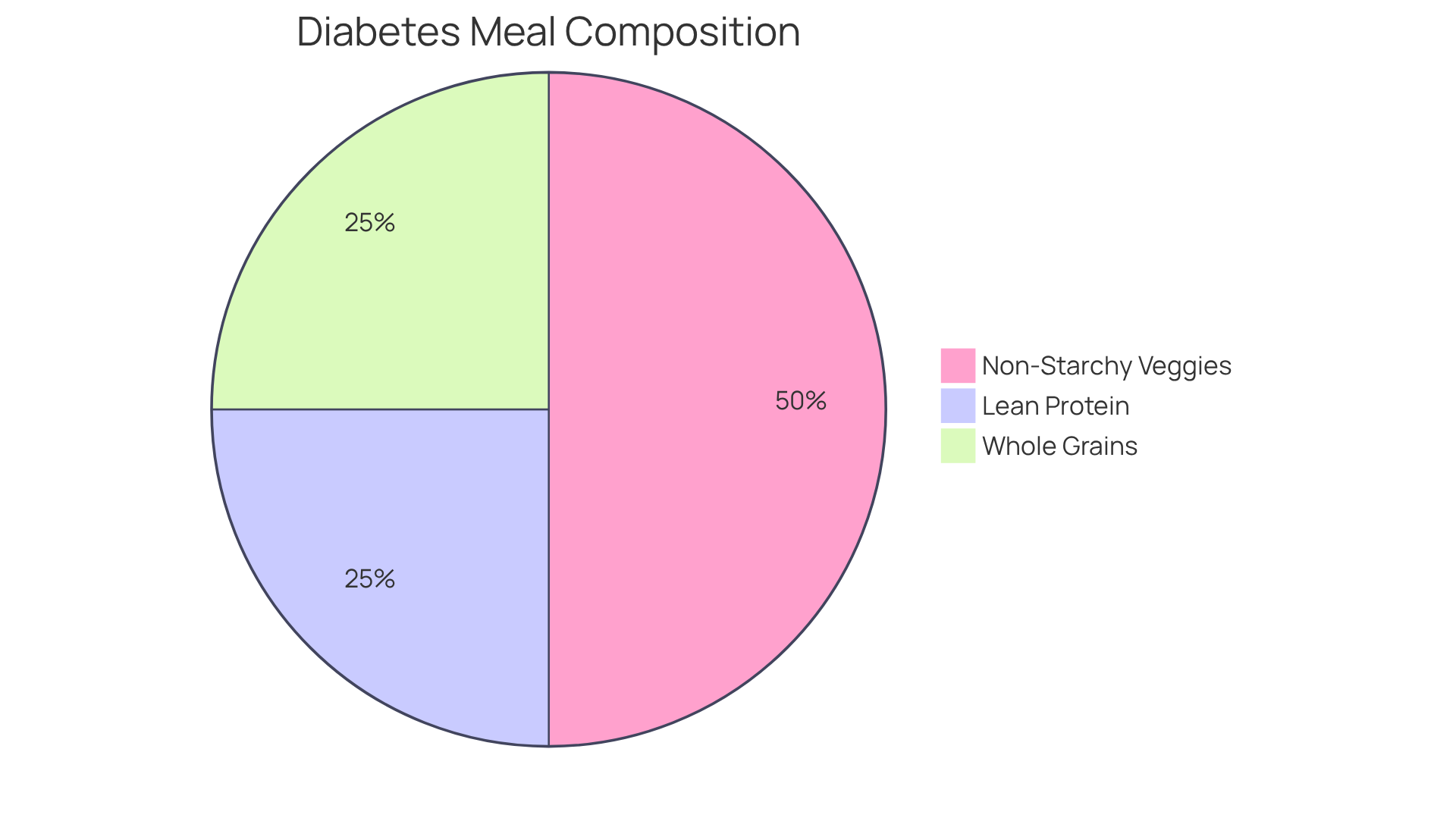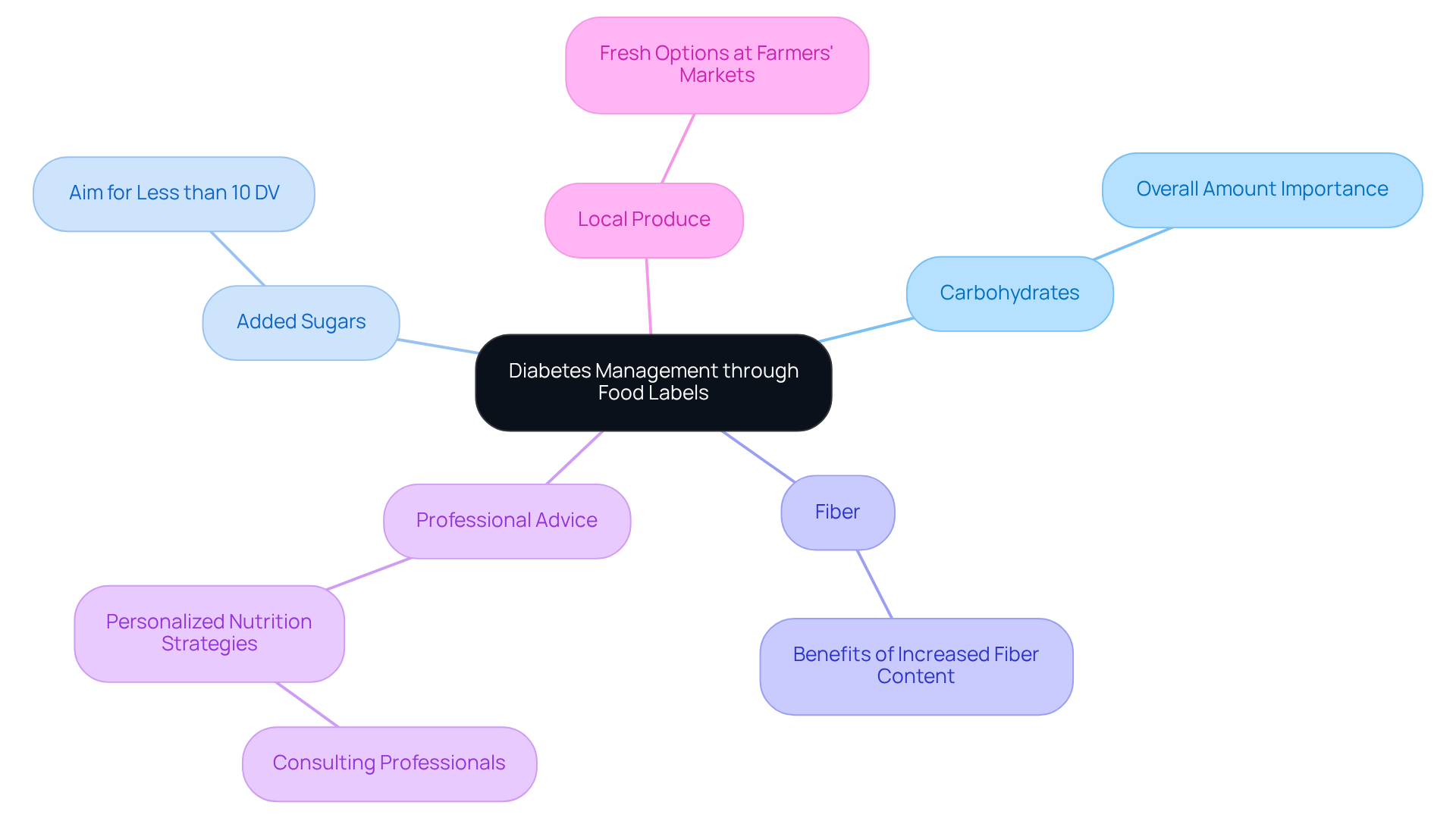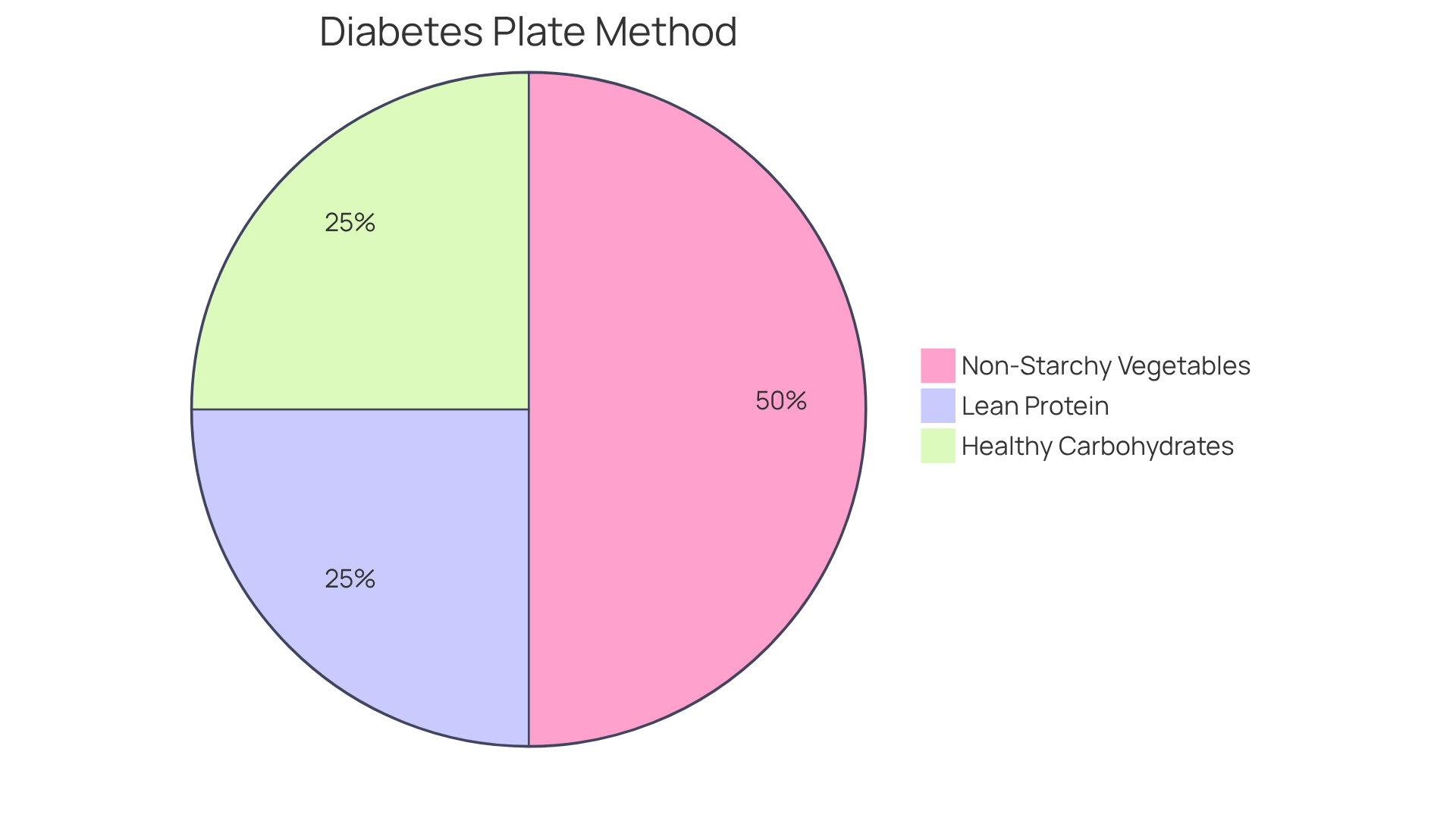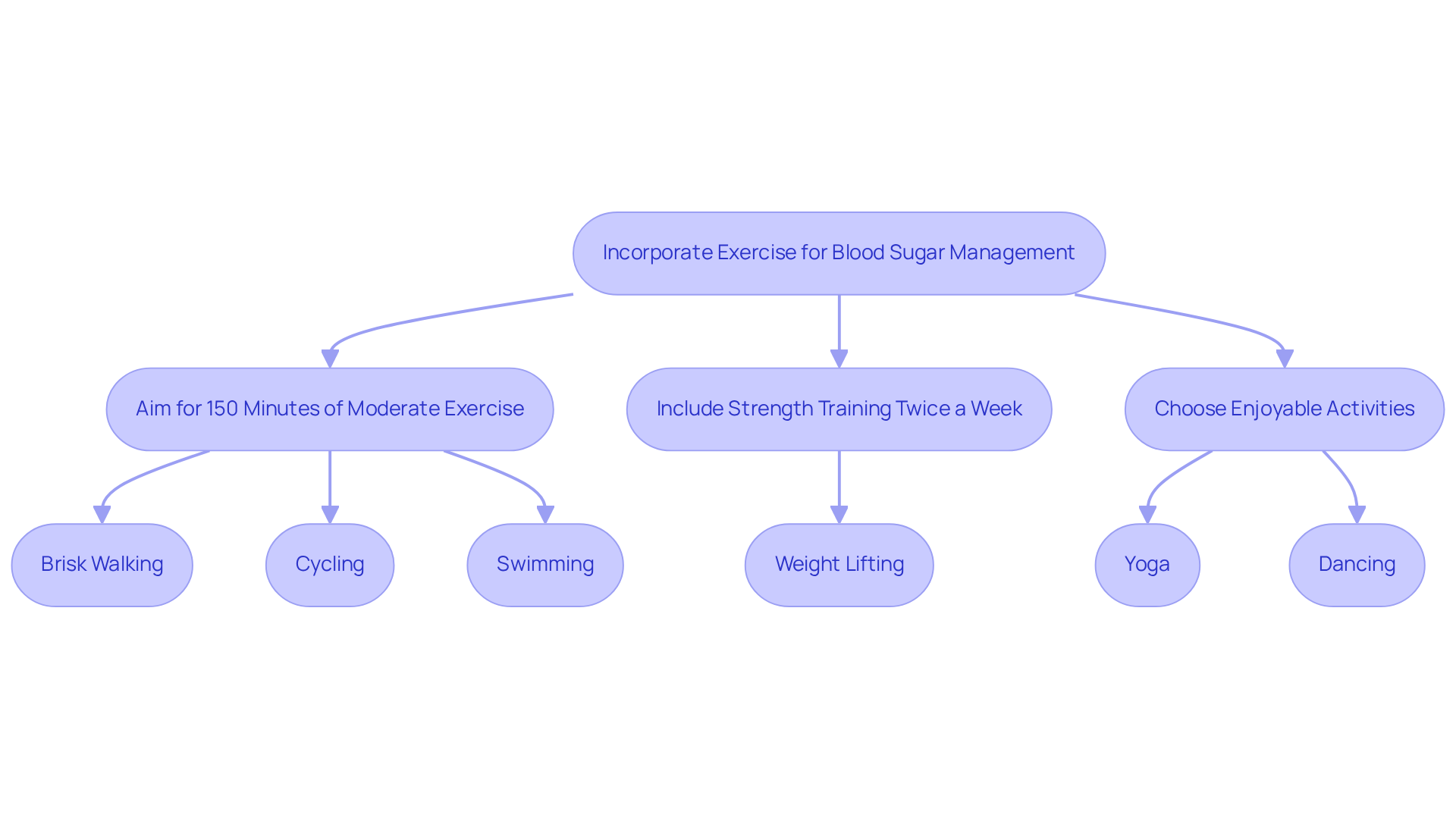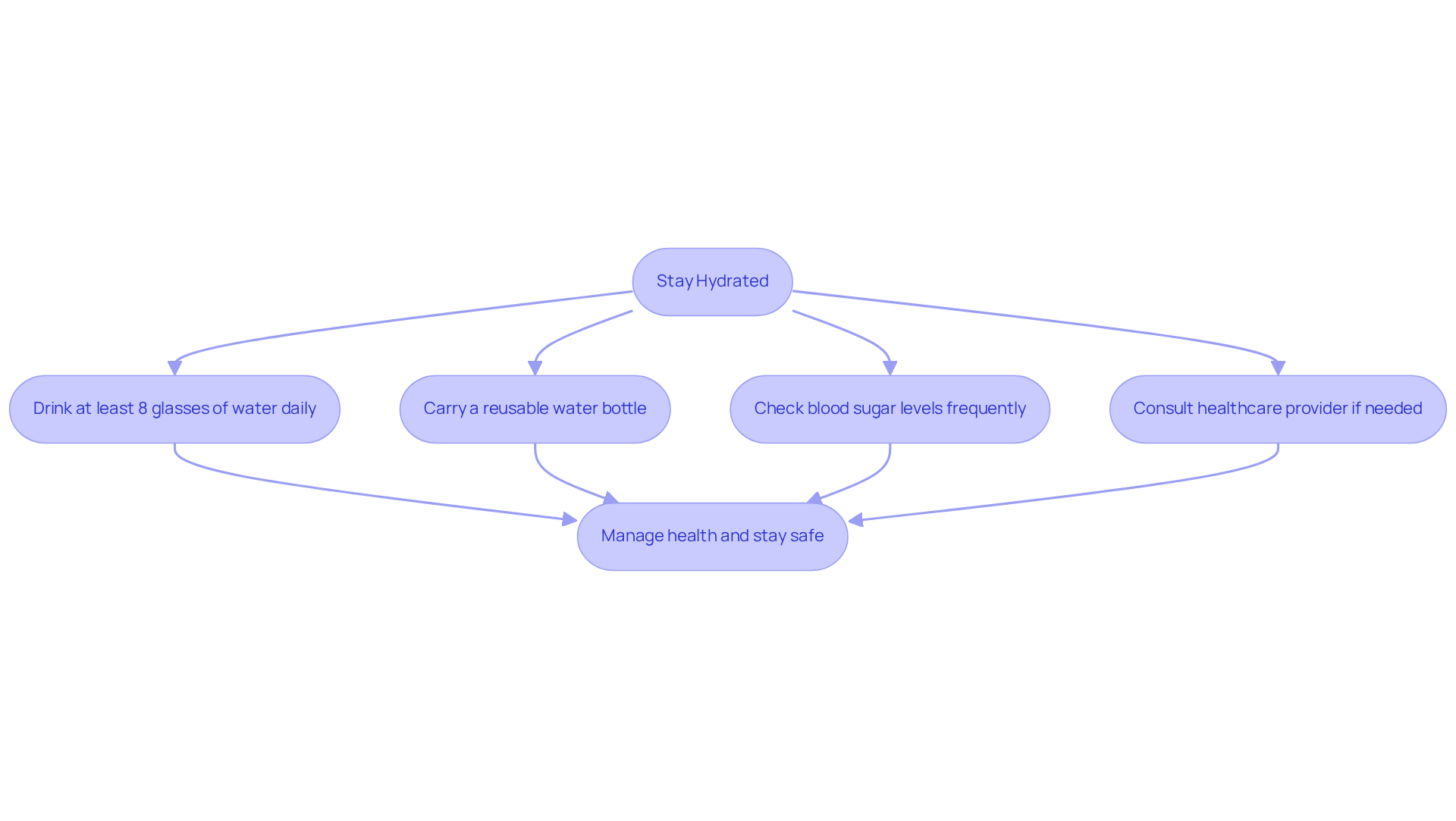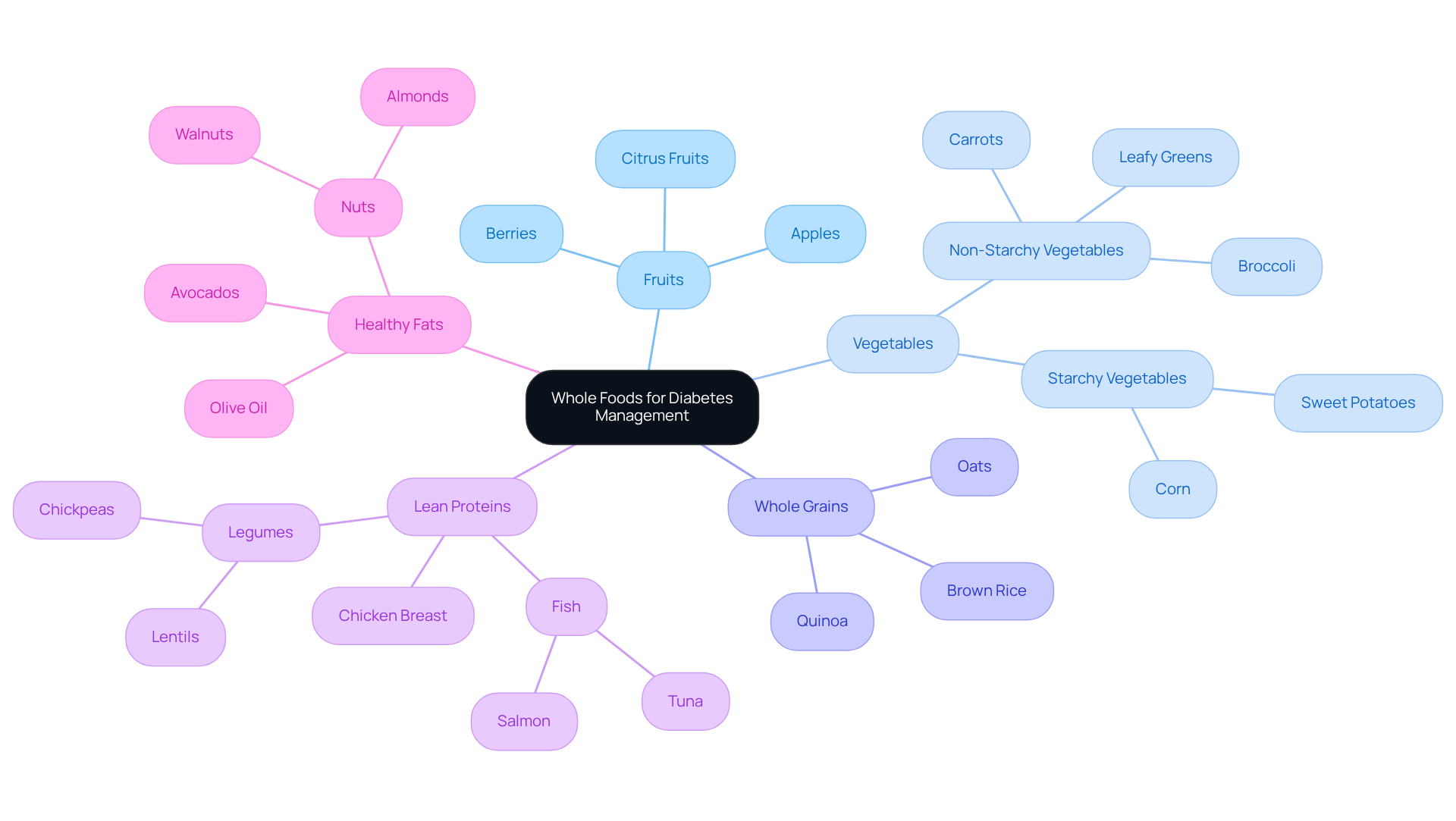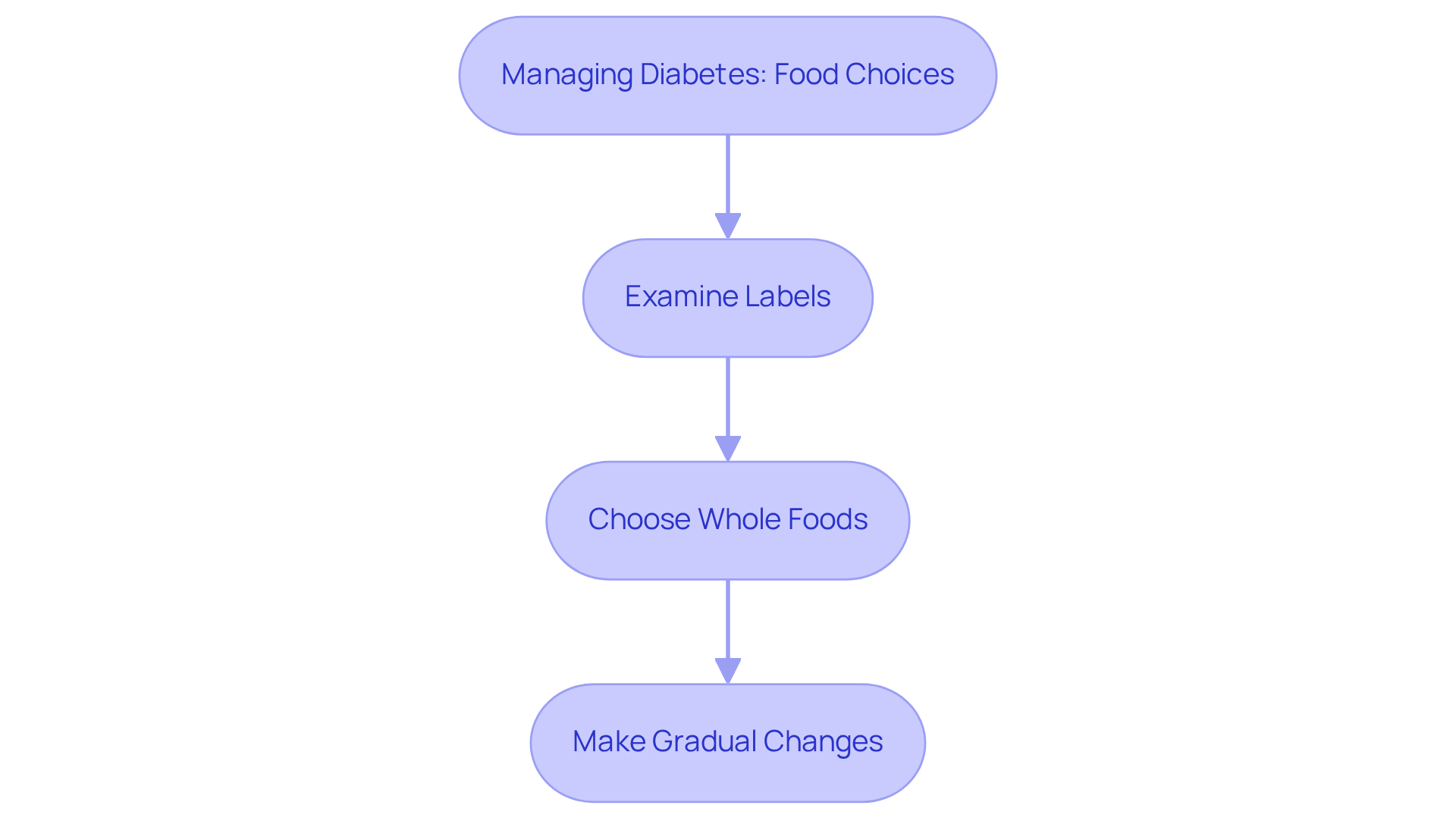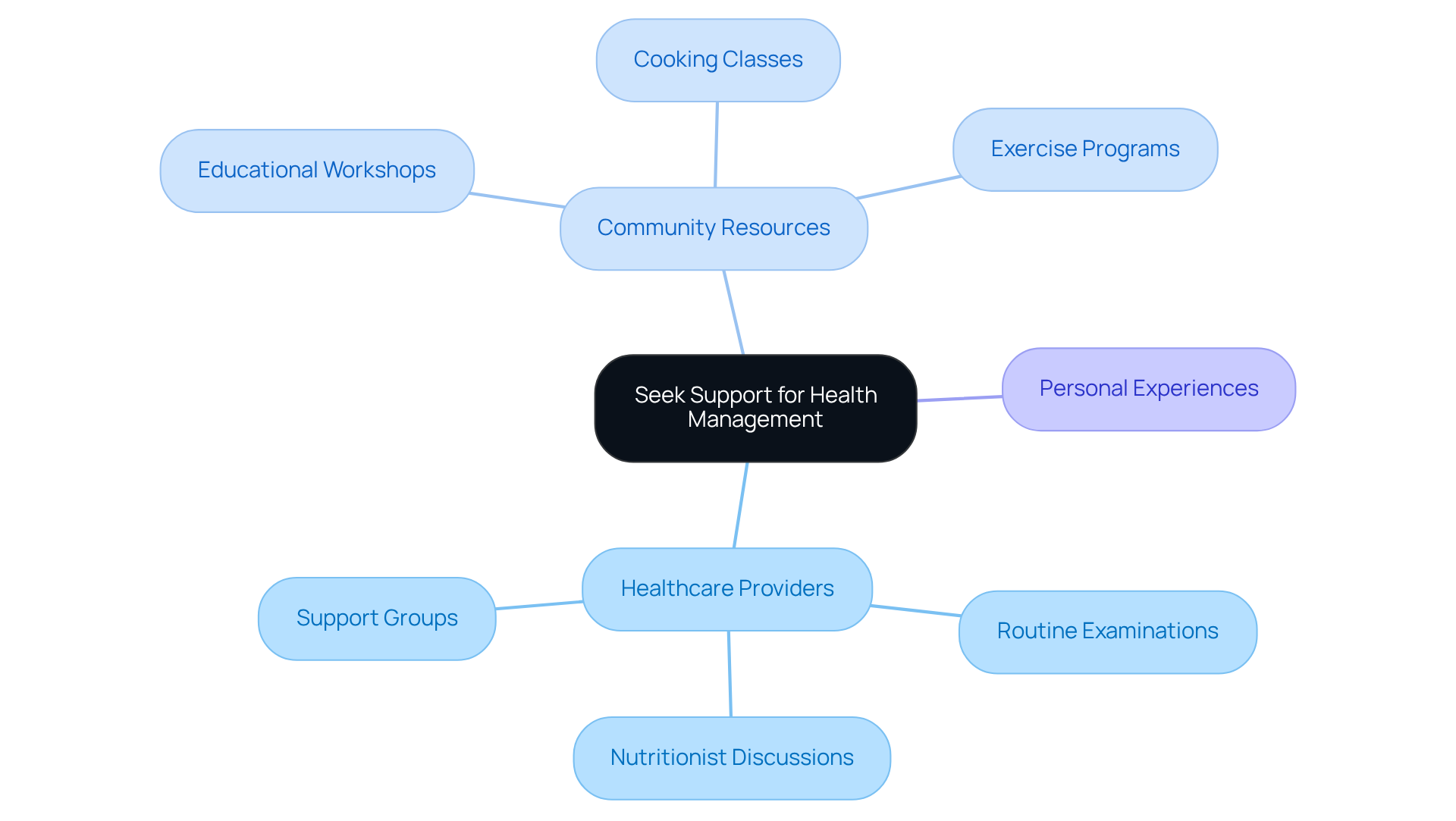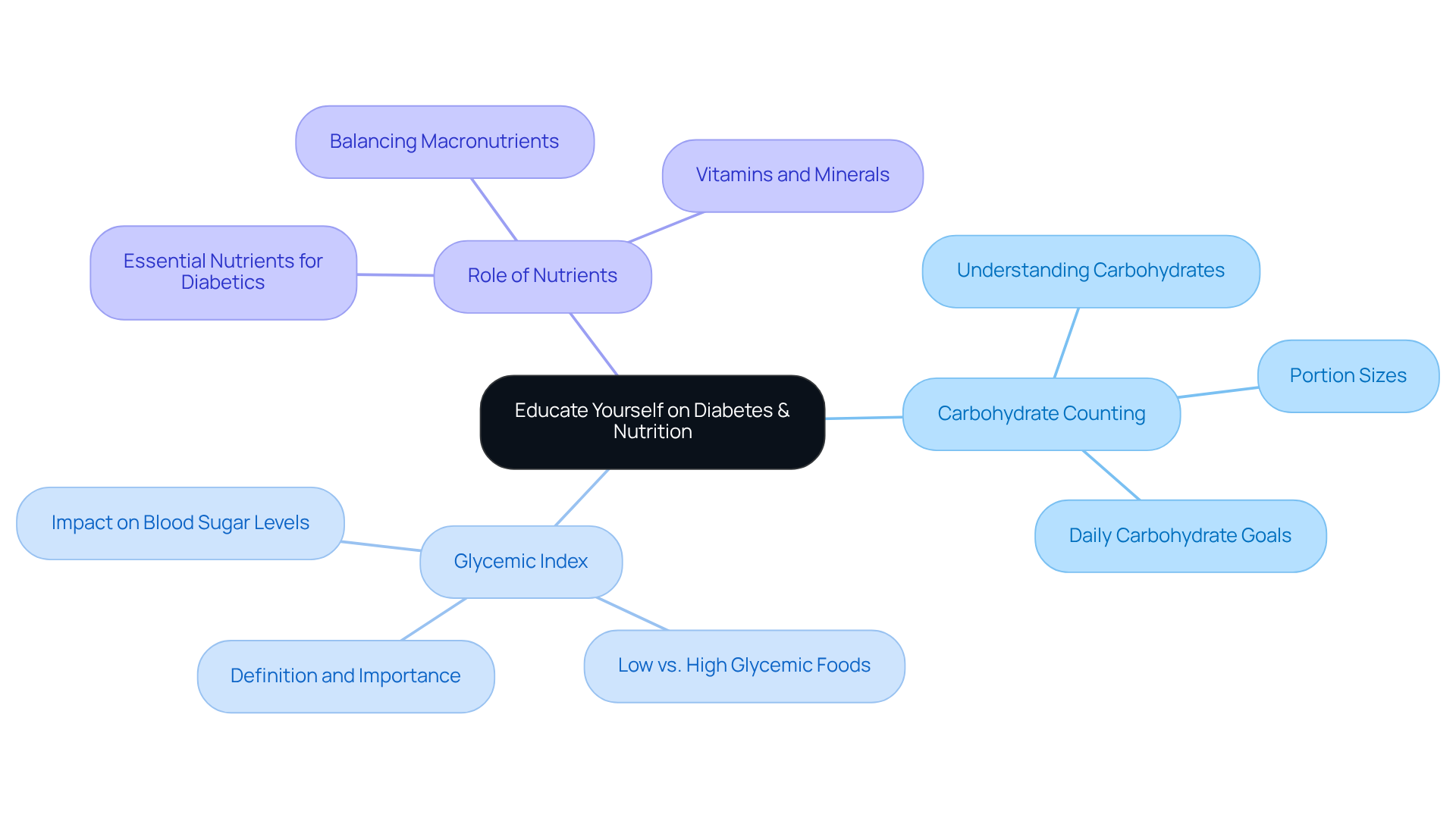Overview
The article “7 Essential Tips for Eating with Diabetes Type 2” offers practical strategies to help manage diabetes through thoughtful dietary choices. It’s important to recognize that navigating diabetes can be challenging, and many individuals may feel overwhelmed by the dietary restrictions. This article emphasizes the importance of:
- Whole foods
- Balanced meals
- Portion control
- Reading food labels
- Staying hydrated
These practices are not just recommendations; they are supported by evidence that shows they can lead to improved blood sugar control and overall health outcomes for those with type 2 diabetes.
Many patients find that making small, manageable changes in their eating habits can significantly impact their well-being. By focusing on whole foods, individuals can nourish their bodies while enjoying a variety of flavors and textures. Balanced meals that include a mix of carbohydrates, proteins, and healthy fats can help maintain stable energy levels throughout the day. Additionally, portion control is a vital skill that can prevent overindulgence and support weight management.
Reading food labels is another essential tip that empowers individuals to make informed choices. It’s easy to overlook hidden sugars and unhealthy ingredients, but taking a moment to check labels can lead to healthier decisions. Staying hydrated is equally important; drinking enough water can help regulate blood sugar levels and support overall health.
As you consider these strategies, remember that you are not alone in this journey. Many people share similar experiences, and it’s perfectly normal to seek support and guidance. By embracing these tips, you can take proactive steps toward managing your diabetes and improving your quality of life. The 30-Day Diabetes Reset program is designed to provide you with the tools and support you need to thrive. Together, let’s work towards a healthier future.
Introduction
Navigating the complexities of diabetes type 2 can feel overwhelming, especially when it comes to making informed dietary choices. It’s crucial to understand that the right nutrition not only plays a significant role in managing blood sugar levels but can also lead to transformative health improvements. Have you ever wondered if there are essential strategies that could empower you to take control of your eating habits and enhance your overall well-being? This article explores seven vital tips for eating with diabetes type 2, offering practical insights that can truly make a difference in your daily life and health outcomes.
Integrative Wellness Center: 30-Day Diabetes Reset Program for Healthier Eating
The 30-Day Diabetes Reset Program at Dr. Jason Shumard’s Integrative Wellness Center is designed to empower you to take charge of your health through a comprehensive and structured approach to nutrition and lifestyle modifications. This groundbreaking, clinically validated program prioritizes whole foods and balanced meals, demonstrating the vital role that food choices play in eating with diabetes type 2 and regulating blood sugar levels. With personalized coaching, educational resources, and continuous support, participants are equipped to seamlessly integrate these positive changes into their daily lives.
It’s important to recognize that organized nutrition plans for eating with diabetes type 2 have shown considerable potential in managing blood sugar levels. Studies suggest that such programs can lead to improved glycemic control and overall wellness outcomes. Many patients find that they experience significant reductions in A1C levels, and some even achieve remission of type 2 diabetes within a few years of diagnosis. Success stories from participants in the Diabetes Reset Program reveal transformative experiences, particularly in relation to eating with diabetes type 2, with many reporting increased energy levels, weight loss, and a renewed sense of control over their well-being, alleviating the anxiety that often accompanies concerns about potential complications.
This program aligns with the latest trends in managing blood sugar levels, advocating for a holistic approach that combines dietary education with behavioral support. By fostering a deeper understanding of nutrition and its effects on health, the 30-Day Diabetes Reset Program aids in diabetes management and promotes eating with diabetes type 2, encouraging long-term lifestyle changes that can lead to lasting improvements in wellness. This innovative method, guided by Dr. Jason Shumard, empowers patients to stabilize their glucose levels without relying on insulin and prescription medications, ultimately transforming their quality of life. To begin your journey toward better health, consider scheduling a consultation today.
Plan Your Meals: Create Balanced Plates for Blood Sugar Control
Managing glucose levels can be challenging, but eating with diabetes type 2 by creating balanced meals is a wonderful way to take control. Imagine filling half your plate with vibrant, non-starchy vegetables when eating with diabetes type 2—these are not only nutritious but also help keep your glucose levels steady. Then, consider dedicating a quarter of your plate to lean protein, which is essential for your body. Finally, reserve the last quarter for whole grains or healthy carbohydrates. This approach to eating with diabetes type 2 ensures that you receive vital nutrients while supporting your health goals.
It’s important to recognize that preparing meals in advance can be a game changer. Many patients find that planning helps prevent spontaneous eating, which can lead to fluctuations in glucose levels. By taking the time to prepare, you’re not just making meals; you’re nurturing your body and mind. You deserve to feel empowered in your health journey.
Read Food Labels: Make Informed Choices for Diabetes Management
Reading food labels can feel overwhelming, can’t it? However, it’s a vital skill for managing eating with diabetes type 2 effectively. When eating with diabetes type 2, it is important to focus on the overall carbohydrate amount, as this directly influences your glucose levels. Look for products with reduced added sweeteners and increased fiber content; these are crucial for maintaining stable blood glucose levels. In San Marcos, CA, you can discover a wealth of fresh, local produce at farmers’ markets that can help you make healthier choices.
It’s important to recognize that the % Daily Value (%DV) can guide you in selecting better options. Aim for foods with less than 10% DV for added sugars and saturated fats. By making informed choices and incorporating seasonal fruits and vegetables into your diet, you can take control of your condition and enhance your overall health, especially when eating with diabetes type 2.
Many patients find that seeking personalized nutrition strategies from professionals, such as Dr. Jason Shumard, can be incredibly beneficial. They can offer tailored advice to assist you on your health management journey. Remember, you are not alone in this; there are resources and support available to help you thrive.
Control Portions: Use the Diabetes Plate Method for Balanced Eating
Managing diabetes can feel overwhelming at times, but the Diabetes Plate Method offers a compassionate approach to portion management that can help you take control of your blood sugar. Imagine your plate divided into sections: fill half with vibrant, non-starchy vegetables, one quarter with lean protein, and the final quarter with healthy carbohydrates. This simple visual guide not only makes meal planning easier but also ensures you receive a balanced intake of essential nutrients while effectively managing your carbohydrate consumption.
Many individuals who have embraced this method share inspiring success stories, highlighting how mindful portioning can lead to significant improvements in blood sugar management. Nutritionists wholeheartedly endorse this approach as a vital strategy for preparing balanced meals that align with your long-term wellness goals. Remember, using a 9-inch plate can reinforce portion control, and measuring serving sizes with your hand can further assist you in maintaining appropriate portions.
Creating individualized dietary plans with the help of registered dietitian nutritionists (RDNs) can enhance the effectiveness of the Diabetes Plate Method. These plans can be tailored to meet your unique health needs and preferences, ensuring a comprehensive approach to managing your blood sugar levels. It’s important to recognize that integrating specific tracking methods, like fitness apps and food logs, alongside goal-setting strategies such as SMART objectives, can empower you to monitor your progress effectively. This not only promotes a sense of accomplishment but also fuels your motivation on your health management journey.
Incorporate Exercise: Boost Your Health with Regular Physical Activity
Managing blood sugar levels can be a challenge, and participating in consistent physical exercise is a crucial step toward achieving that balance. Aim for at least 150 minutes of moderate-intensity exercise each week—think brisk walking, cycling, or swimming. Many individuals find that engaging in physical activity significantly improves their insulin sensitivity and lowers glucose levels, making it an essential aspect of managing diabetes.
It’s important to recognize that incorporating strength training exercises at least twice a week can also be beneficial. This not only helps increase muscle mass but further enhances glucose control. Finding activities that you genuinely enjoy is key to making exercise a sustainable part of your daily routine. After all, when you love what you do, it becomes easier to stick with it.
As fitness professionals often emphasize, the right mix of aerobic and resistance training not only supports blood sugar management but also contributes to your overall health and well-being. Success stories from individuals who have embraced physical activity highlight the transformative effects that exercise can have on managing blood sugar levels and improving quality of life. Remember, every small step counts, and you have the power to make a positive change.
Stay Hydrated: Choose Water Over Sugary Beverages
Staying hydrated is essential for everyone, especially for those who are eating with diabetes type 2, particularly during a heat wave. Water is the optimal option for hydration, as it contains no calories or sweeteners. Have you ever noticed how sweet drinks, like sodas and fruit juices, can lead to spikes in glucose levels and even contribute to weight gain? It’s important to aim for at least eight glasses of water a day. Consider carrying a reusable water bottle to remind yourself to stay hydrated throughout the day.
During extreme heat, it’s crucial to drink plenty of water even if you don’t feel thirsty. This helps your body sweat and maintain a normal temperature. Many patients find that dressing in light-colored, loose-fitting clothing can also help reflect heat and limit sun exposure during peak hours. Don’t forget to check your blood sugar levels more often, as heat can influence them. It’s always a good idea to speak with your healthcare provider about any necessary modifications to your medications.
By prioritizing hydration and being mindful of eating with diabetes type 2 during heat waves, you can effectively manage your health and stay safe. Remember, taking these small steps can make a big difference in your overall well-being.
Choose Whole Foods: Prioritize Nutrient-Dense Options for Better Health
It is crucial for eating with diabetes type 2 to prioritize whole foods in your diet. Whole foods, including fruits, vegetables, whole grains, lean proteins, and healthy fats, are abundant in nutrients and fiber, which can assist in managing glucose levels. Have you thought about how filling half of a nine-inch plate with non-starchy vegetables like broccoli, carrots, and leafy greens can ensure a colorful variety? Selecting whole grains instead of refined grains offers more fiber and nutrients, which can help stabilize glucose levels. Additionally, including nutritious fats, like avocados, nuts, and olive oil, can aid in reducing cholesterol and safeguard cardiovascular wellness. These dietary choices are essential for eating with diabetes type 2 as they not only support blood sugar regulation but also enhance overall wellness and well-being.
Dr. Jason Shumard, D.C., with his expertise in functional medicine, has assisted numerous patients through his 30-Day Diabetes Reset program, resulting in substantial improvements in well-being. For instance, one patient reported losing 55 lbs and reducing their A1C from 9.1 to 5.7. Another shared how they no longer needed medications after experiencing increased energy and improved mood. These testimonials showcase the transformative power of nutrient-dense eating habits.
By making informed food selections and concentrating on whole foods, individuals can take proactive measures toward improved health and blood sugar management, especially when it comes to eating with diabetes type 2. It’s important to recognize that keeping a food diary can help track your meals and identify areas for improvement in your diet. Remember, every small change can lead to significant progress on your journey to better health.
Limit Processed Foods: Reduce Sugar and Refined Carbohydrates
Managing diabetes can feel overwhelming at times, especially when it comes to making dietary choices related to eating with diabetes type 2. It’s important to recognize that limiting processed foods is crucial for effective eating with diabetes type 2. These items often contain added sugars, unhealthy fats, and refined carbohydrates, which can lead to substantial glucose spikes. Instead of opting for packaged snacks or fast food, consider prioritizing whole, minimally processed options that are beneficial when eating with diabetes type 2.
Have you ever taken a moment to examine the labels on your favorite snacks? Many patients find that by thoroughly checking labels, they can choose items with fewer components and no added sweeteners. Research indicates that for those eating with diabetes type 2, reducing processed food intake can lead to better blood sugar control and overall health improvements. By making these dietary adjustments, you can improve your ability to manage this condition while focusing on eating with diabetes type 2 effectively.
Remember, this journey is about progress, not perfection. Small changes can make a significant difference in your health. Embrace the opportunity to explore new, wholesome foods and enjoy the benefits that come with them. You have the power to take control of your health, one meal at a time.
Seek Support: Engage with Healthcare Providers and Community Resources
Interacting with healthcare professionals and community resources can significantly enhance your journey in managing this condition. It’s important to recognize that routine examinations with your physician, discussions with a certified nutritionist, and participation in support groups for blood sugar management can provide valuable insights and encouragement.
At Integrative Wellness Center, we empower our patients through personalized plans and comprehensive testing that go beyond typical lab work. We address the unique factors contributing to your condition, ensuring you feel supported every step of the way. Many patients find that numerous communities offer resources like:
- Educational workshops
- Cooking classes
- Exercise programs designed specifically for individuals with health conditions
Don’t hesitate to reach out for support—you’re not alone in this journey. Our clients have successfully transformed their well-being by embracing these holistic solutions, shedding unwanted pounds, and learning to manage their blood sugar levels effectively. Remember, each step you take is a step toward a healthier you, and we are here to guide you along the way.
Educate Yourself: Stay Informed About Diabetes and Nutrition
Staying informed about blood sugar disorders and nutrition is crucial for effective management. It’s important to recognize that understanding how food choices impact your health can feel overwhelming at times. However, taking the time to read books, attend seminars, and explore reputable online resources can make a significant difference.
Many patients find that knowledge about:
- carbohydrate counting
- glycemic index
- the role of different nutrients
empowers them to make better dietary decisions for eating with diabetes type 2. The more you learn about eating with diabetes type 2, the more confident you will feel in managing your diabetes and enhancing your overall well-being. Remember, you’re not alone on this journey—every step you take toward understanding is a step toward a healthier you.
Conclusion
Eating with type 2 diabetes requires a thoughtful approach to nutrition and lifestyle, emphasizing the importance of making informed food choices. It’s important to recognize that adopting strategies such as meal planning, understanding food labels, and prioritizing whole foods can help you manage your blood sugar levels effectively while enhancing your overall health. The insights shared throughout this article highlight that small, consistent changes can lead to significant improvements in well-being.
Many patients find that key strategies include:
- The Diabetes Plate Method for portion control
- Staying hydrated
- Engaging in regular exercise
Engaging with healthcare professionals and utilizing community resources can provide crucial support on this journey. Furthermore, educating yourself about nutrition and diabetes can empower you to make better dietary decisions, ultimately fostering a sense of control over your health.
Embracing these essential tips not only aids in managing diabetes but also promotes a healthier lifestyle overall. Taking proactive steps—whether through joining a structured program like the 30-Day Diabetes Reset or simply making more nutritious food choices—can pave the way for a more vibrant and fulfilling life. Remember, every small effort counts, and the path to better health begins with informed decisions and consistent action.
Frequently Asked Questions
What is the 30-Day Diabetes Reset Program?
The 30-Day Diabetes Reset Program at Dr. Jason Shumard’s Integrative Wellness Center is a structured approach designed to help individuals manage type 2 diabetes through nutrition and lifestyle modifications, emphasizing whole foods and balanced meals.
How does the program help manage diabetes?
The program supports participants by providing personalized coaching, educational resources, and continuous support, which helps them integrate healthy changes into their daily lives and manage blood sugar levels effectively.
What are the potential benefits of participating in the program?
Participants may experience improved glycemic control, significant reductions in A1C levels, increased energy, weight loss, and a greater sense of control over their health, with some even achieving remission of type 2 diabetes.
What is the recommended approach to meal planning for diabetes management?
A balanced meal should consist of half a plate of non-starchy vegetables, a quarter of lean protein, and a quarter of whole grains or healthy carbohydrates to help maintain stable glucose levels.
How can meal preparation impact diabetes management?
Preparing meals in advance can prevent spontaneous eating, which may lead to fluctuations in glucose levels, empowering individuals to take control of their health.
Why is reading food labels important for managing diabetes?
Reading food labels helps individuals focus on overall carbohydrate content, avoid added sugars, and choose foods with higher fiber, which are essential for maintaining stable blood glucose levels.
What should I look for on food labels when managing diabetes?
Aim for products with less than 10% Daily Value (%DV) for added sugars and saturated fats, and choose items with reduced sweeteners and increased fiber content.
How can local resources assist in making healthier food choices?
Fresh, local produce available at farmers’ markets can help individuals make healthier choices and incorporate seasonal fruits and vegetables into their diets.
Can professional guidance enhance diabetes management?
Yes, seeking personalized nutrition strategies from professionals like Dr. Jason Shumard can provide tailored advice and support for managing diabetes effectively.
